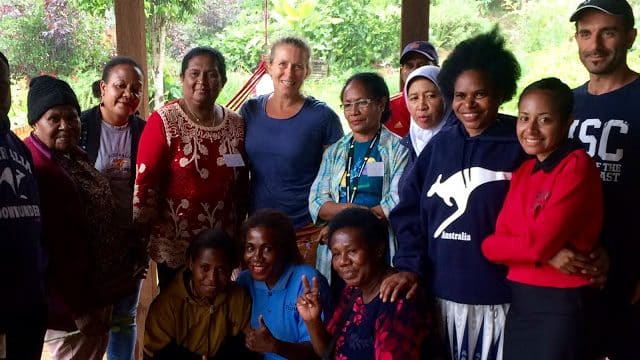A group of West Papuan visitors came over to my place today to explore ideas around working with children in the garden – for better health and well-being. We had a great time talking, tasting and smelling our way through the garden sharing stories, ideas and ways of using plants.
This was a group of early childhood teachers. They are here in Australia to explore ways to improve children’s health and nutrition in West Papua; to take a look learning opportunities for children (through food gardens makes such good common sense); and importantly exploring micro-enterprise ideas too.
 |
| Out of focus image, but clear joy in connecting today. |
The International Development program of University of the Sunshine Coast are hosting them for over a month and brought them up here today to explore my permaculture garden and garden-based education ideas. Over the past 22 years I’ve worked in over 20 countries with groups such as this – and particularly women and children. It’s been a while since I taught in Indonesia and my Bahasa was very rusty (thankfully an interpreter cam with them) – I am determined to get back into the swing of it. Back in 1999 I led a women’s permaculture design course in Indonesia with participants from one end of the country to the other – West Papua to Aceh.
Looking at the issue of health and nutrition, particularly for children and women is critical. West Papua has the highest infant mortality (70-200/1000) and maternal mortality rates (4.5/1000). NGOs working in the area say malnutrition is the major underlying cause. More than 20 per cent of people living in the central highlands experience some degree of malnutrition and less than half the children under five are said to be well nourished. (https://www.cs.utexas.edu/users/cline/papua/health.htm)
I was absolutely delighted to welcome these wonderfully warm and knowledgable women, and men, here this morning. I just wish they could have stayed longer and we could have had a big cook-up together from the garden, and the chance to share more. We had just got started!
My heart is still singing, and my motivation to continue this work fuelled immensely.



How wonderful to share your garden (and aspects of your permaculture life) with peoples from other countries. There's such richness to be shared and to be gained in doing that. I know, having taught many young children for many years, that they are often fascinated by the lives of others, the countries, stories and traditions of others and what better way to learn than by meeting and welcoming peoples from all over the world to your place! Meg:)
What a beautiful and rewarding life you have created for yourself and your family, very inspiring 🙂